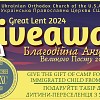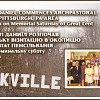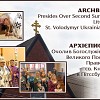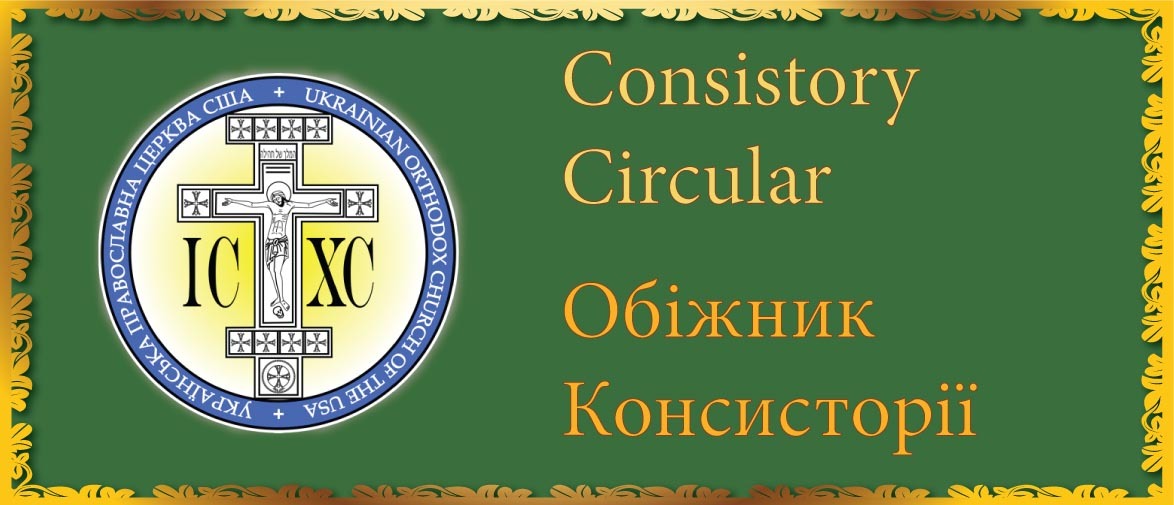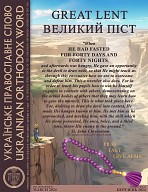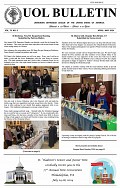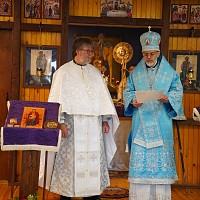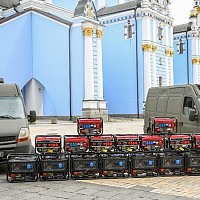UKRAINIAN ORTHODOX CHURCH OF THE USA
CONSISTORY OFFICE OF PUBLIC RELATIONS
PRESS RELEASE
Great and Holy Saturday at Holy Trinity Ukrainian Orthodox Church in Bensenville, IL!
On Holy Saturday, His Grace Bishop Daniel, the Ruling Hierarch of the Western Eparchy of the Ukrainian Orthodox Church of the USA presided over the Vesperal Liturgy of St. Basil the Great at Holy Trinity Ukrainian Orthodox Church in Bensenville, IL, during which numerous faithful of Chicago Deanery and greater Chicago Metropolitan area prayerfully gathered to reflect upon the great Mystery of salvation of the Crucified Savior.
Serving at the altar of the newly consecrated church with Vladyka Daniel were Very Rev. Fr. Bohdan Kalynyuk, pastor and Dean of the Chicago Deanery, Rev. Fr. Vasyl Dmytryshyn and Protodeacon Andriy Fronchak of St. Volodymyr Ukrainian Orthodox Cathedral in Chicago, IL.
The Liturgy served on the morning of Holy and Great Saturday is that of Saint Basil the Great. It begins with Vespers. After the entrance, the evening hymn 'O Gentle Light' is chanted as usual. Then the Old Testament readings are recited. They tell of the most striking events and prophecies of the salvation of mankind by the death of the Son of God. The account of creation in Genesis is the first reading. The sixth reading is the story of Israel's crossing of the Red Sea and Moses' song of victory - over Pharaoh, with its refrain: 'For gloriously is He glorified'. The last reading is about the Three Children in the fiery furnace of Babylon, and their song of praise with its repeated refrain: 'O praise ye the Lord and supremely exalt Him unto the ages.' In the ancient church the catechumens were baptized during the time of these readings. The Epistle which follows speaks of how, through the death of Christ, we too shall rise to a new life.
After the Epistle, the choir chants, like a call to the sleeping Christ: 'Arise, O Lord, Judge the earth, for Thou shall have an inheritance among all the nations..." As the chanting progresses, the altar vestments as well as all sacred vestments are changed in the temple into the bright snow-white colors. The deacon carries out the Book of the Gospels, and reads the first message of the resurrection from Saint Matthew. Because the Vespers portion of the service belongs to the next day (Pascha) the burial hymns of Saturday are mingled with those of the resurrection, so that this service is already full of the coming Paschal joy.
In his sermon His Grace bishop Daniel shared with the faithful in attendance: “This is the Blessed Sabbath. The "Great and Holy Sabbath" is the day which connects Great and Holy (Good) Friday, the commemoration of the Cross, with the day of His Resurrection. To many the real nature and the meaning of this "connection", or "middle day", remains obscure. For a good majority of churchgoers, the "important" days of Holy Week are Friday and Sunday, the Cross and the Resurrection. These two days, however, remain somehow "disconnected." There is a day of sorrow, and then, there is the day of joy. In this sequence, sorrow is simply replaced by joy, but according to the teaching of the Orthodox Church, expressed in Her Liturgical tradition, the nature of this sequence is not that of a simple replacement. The Church proclaims that Christ has "trampled death by death."
It means that even before the Resurrection, an event takes place, in which the sorrow is not simply replaced by joy, but is itself transformed into joy. Great Saturday is precisely this day of transformation, the day when victory grows from inside the defeat, when before the Resurrection; we are given to contemplate the death of death itself. All this is expressed, and even more, all this really takes place every year in this marvellous morning service, in this liturgical commemoration which becomes for us a saving and transforming present.
In coming to the Church on the morning of Holy Saturday, Friday has just been liturgically completed…
The death of Christ is the ultimate proof of His love for the will of God, of His obedience to His Father. It is an act of pure obedience, of full trust in the Father's will; and for the Church it is precisely this obedience to the end, this perfect humility of the Son that constitutes the foundation, the beginning of His victory. The Father desires this death, the Son accepts it, revealing an unconditional faith in the perfection of the Father's will, in the necessity of this sacrifice of the Son by the Father. Psalm 119 is the psalm of that obedience, and therefore the announcement that in obedience the triumph has begun.
But why does the Father desire this death? Why is it necessary? The death of Christ is described as His descent into Hades. "Hades" in the concrete Biblical language means the realm of death, which God has not created and which He did not want; it also signifies that the Prince of this world is all powerful in the world. Satan, Sin, Death - these are the "dimensions" of Hades, its content. For sin comes from Satan and Death is the result of sin - "sin entered the world, and death by sin." (Romans 5:12).
The entire universe after the fall had become a cosmic cemetery; it was condemned to destruction and despair. And this is why death is "the last enemy," (1 Corinthians 15:20) and its destruction constitutes the ultimate goal of the Incarnation. This encounter with death is the "hour" of Christ of which He said that "for this hour have I come." (John 12:27) Now this hour has come and the Son of God enters into Death. The Holy Fathers of the Church usually describe this moment as a duel between Christ and Death, Christ and Satan. For this death was to be either the last triumph of Satan, or his decisive defeat. The duel develops in several stages. At first, the forces of evil seem to triumph. The Righteous One is crucified, abandoned by all, and endures a shameful death.
He also becomes the partaker of "Hades," of this place of darkness and despair. But at this very moment, the real meaning of this death is revealed. The One who dies on the Cross has Life in Himself, i.e., He has life not as a gift from outside, a gift which therefore can be taken away from Him, but as His own Essence. For He is the Life and the Source of all life. "In Him was Life and Life was the light of man." The man Jesus dies, but this Man is the Son of God. As man, He can really die, but in Him, God Himself enters the realm of death. This is the unique, the incomparable meaning of Christ's death. In it, the man who dies is God, or to be more exact, the God-Man. God is the Holy Immortal; and only in the unity "without confusion, without change, without division, without separation" of God and Man in Christ can human death be "assumed" by God and be overcome and destroyed from within, be "trampled down by death."
Death is destroyed by Life! Now we understand why God desires that death, why the Father gives His Only Begotten Son to it. He desires the salvation of man. Hence the necessity of the Incarnation and the necessity of that Divine death. Death was not only destroyed by God, but was overcome and trampled down in human nature itself by man and through man.
"For since by man came death, by man came also the resurrection of the dead." (1 Corinthians 15;21) Sabbath, the seventh day, achieves and completes the history of salvation, its last act being the overcoming of death. But after the Sabbath comes the first day of a new creation, of a new life born from the grave.
However, we are still in Great Saturday before Christ's tomb, and we have to live through this long day, before we hear at midnight 'Christ is Risen!', before we enter into the celebration of His Resurrection. Thus, the third lesson -- Matthew 27:62-66 - which completes the service, tells us once more about the Tomb - 'which was made secure by sealing the stone and setting a guard." …Christ arose again from the dead. His Resurrection we will celebrate the next day on Pascha (Easter). This celebration, however, commemorates a unique event of the past, and anticipates a mystery of the future. It is already His Resurrection, but not yet ours.
We will have to die, to accept the dying, the separation, the destruction. Our reality in this world, is the reality of the Great Saturday; this day is the real image of our human condition. We believe in the Resurrection, because Christ has risen from the dead. We expect the Resurrection. We know that Christ's death is no longer the hopeless ultimate end of everything, Baptised into His death, we partake already of His life that came out of the grave. We receive His Body and Blood, which are the food of immortality. We have in ourselves the token, the anticipation of the eternal life. All our Christian existence is measured by these acts of communion to the life of the "new eon" of the Kingdom, and yet we are here, and death is our inescapable share. But this life between the Resurrection of Christ and the day of the common resurrection, is it not precisely the life in the Great Saturday? Is not expectation the basic and essential category of Christian experience? We wait in love, hope and faith. We wait for "the Resurrection and the life of the world to come” (see Nicene Creed).
Every year, on Great and Holy Saturday, after this morning service, we wait for the Easter night and the fullness of Paschal joy. We know that they are approaching -- and yet, how slow is this approach, how long is this day! But is not the wonderful quiet of Great Saturday the symbol of our very life in this world? Are we not always in this "middle day," waiting for the Pascha of Christ, preparing ourselves for the day without evening of His Kingdom?..
My brothers and sisters, on His cross Christ bore our individual sins and shortcomings, our weaknesses, our spiritual sickness and death. Rising from the tomb, He raises Adam and Eve and every one of us to newness of life in Him. It is this message that we are called to share (the message of faith and love) to a world that knows too much pain and division. Let us proclaim to all the world, "Come, receive the light and glorify Christ who is risen from the dead".
Following the Liturgical service, Bishop Daniel visited with the faithful of Holy Trinity parish community and on his way back to St. Volodymyr’s cathedral, the bishop paid a visit to Sts Peter and Paul Ukrainian Orthodox parish in Palos Park, IL (Rev. Fr. Vasyl Sendeha - pastor) in order to venerate the Holy Shroud and witness the love of the parish’s youth in chanting the Acts of the Apostles by the Shroud.
|
| |||||||||||||


